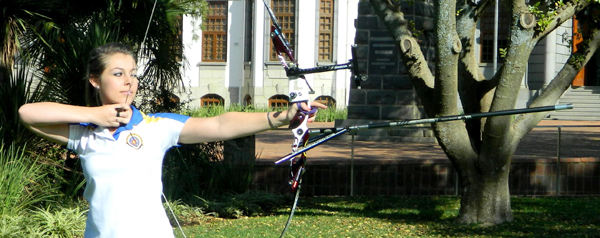
Sariça Coetzee
For some of us, archery is just something we see on film and television, like in the Hunger Games movies or on the Arrow TV series. Sariça Coetzee, a first-year BA Psychology and Criminology student, however, is almost like South Africa’s very own Katniss Everdeen.
Sariça recently won two gold medals in the division for Junior Women at the South African National Archery Association’s (SANAA’s) National Archery Championships. With the qualifying heats taking place next year, the Olympic Games of 2016, which is just around the corner, is beckoning her.
“I am working hard to get there and would love to go,” says Sariça.
“I train on a regular basis with Riaan Schoeman from Kovsies’ Exercise and Sport Sciences, in order to improve my technique and strength.”
Sariça’s training includes shooting at targets and spending time in the gym.
“I spend about three hours per day, four days a week, on training. In archery it is crucial to be able to keep your body stable when the wind is blowing.”
Sariça, who matriculated at Sentraal High School in Bloemfontein, stared with archery seven years ago.
“We drove past Old Grey’s archery club and I just wanted to do it as well,” she says.
“I begged my parents for almost a year to let me do it. They thought it was just a passing fancy, but I really developed a passion for the sport and had a feeling for archery from the beginning.”